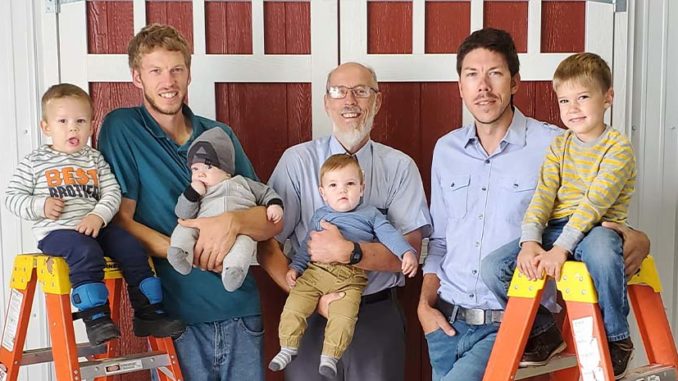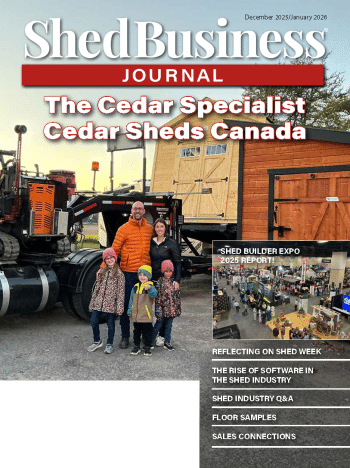
Joshua and Michael Yoder are brothers … and more.
Today, they are also business partners, owners of Yoder’s Quality Barns in Bluffton, Indiana.
Like many family shed businesses, the story begins with the father, John, who took a position with a builder in the area. The builder was working by himself and needed help, so John signed on.
He did that for several years until 1999 when the builder decided to retire. That’s when John took the leap and bought the company. In time, many family members were helping with the business, including Joshua and Michael.
Fast forward 20 years and the brothers decided to partner to purchase Yoder’s Quality Barns.
“[Being partners] is good, so far,” shares Joshua. “We both have different ideas and strengths and weaknesses, so that’s good for us to work together and balance each other out.”
“We always feel like our personalities complement each other,” agrees Michael. “There are different areas of the business that we both enjoy, and so it’s been seeming to work out really well.”
Michael left Yoder’s in 2013 to work for a general contractor while Joshua kept building with John.
“That gave me a lot of experience in residential construction and commercial construction,” Michael shares. “That actually has been really valuable to us. I got my contractor’s license. For Allen County, which is the Fort Wayne area here, you need to have one, and that’s been really successful to allow us to build in Allen County.”
Joshua and Michael have focused on making the company’s operations efficient since they bought the business.
“Back when we were growing up, it was the start of the family business, even our sisters helped, and so it always was a fairly laid-back operation,” says Michael.
“Now we’re both married. We’re supporting seven households. Before, we saw ways to make this or that go faster, but we never did it. When we started with the business, we decided we’re not going to do that on Fridays or we’ll weld up whatever we need to or make what we need to do in order to not have those issues.
“We’ve tried to stay disciplined with that, and there are a lot of things that we’ve changed in the last year or two that have just all helped together to speed things up. And it’s definitely made a difference in the end.”
An example Joshua gives of being intentional about making improvements happen is the company’s dedicated on-site vehicle. The brothers made a plan and made sure the crew cab truck with a covered utility bed was outfitted with the tools, hardware, nails, etc. to make it Yoder’s “on-site multi-tool.”
“There are lots of little things that have made the whole process go faster as far as building sheds,” he adds.
John is still part of the business, working in the office, interacting with customers.
“I would say a success is just being able to work together and watching a lot of good things happen because we have three perspectives,” says Joshua. “We work together and are able to make a lot of things happen that wouldn’t happen with even just two or, for sure, with just one of us.”
Not that working together as a family is without challenges.
“Because it’s a family business, there are just some relational issues that are tied into that,” Michael points out. “It’s just a shift with dad involved. He’s always been the one to say what goes and how to do things, all that.
“But now that we’re in charge, we all had to get used to how things work. He’s our employee now, instead of us being his employees. It makes it a little bit interesting, but I feel like it’s working good altogether.
“He does pretty much all the office work and the customer work and so Josh and I pretty much head up the operations and Josh heads up the deliveries. And I kind of deal with the on-site stuff, more and inventory.”
OPERATIONS TODAY
Yoder’s Quality Barns is more of a custom shop, says Joshua, building most structures directly for customers with a team of seven.
Annually, they build between 150-175 projects, from small sheds up to full-size garages.
While the team spends most of its time building in the shop, Joshua says up to 40 percent of the work is done on-site.
“We do a fair amount of prefab,” he shares. “If we go on-site, we’ll prefab the walls and whatever we can in the shop and then go out and build on-site. A lot of on-site projects, if they’re normal shed size up to 12 by 24, 14 or even 16 by 24 we try to prefab everything, and we can do the project in a day.
“Structures above that, and, of course, if there’s concrete, there are more days involved. We do concrete for a fair amount of projects as well.”
Yes, Yoder’s Quality Barns includes site prep in its shed-building process. Typically, Yoder’s site prep consists of digging the sod out from underneath each block, putting stone in each hole where the block goes, and then leveling all the blocks up with each other.
Joshua says including site prep started with the company simply wanting to make sure each of their sheds was in a place where they were not going to move.
“Also, I think it was initially kind of connected to our name,” he adds. “We wanted our sheds to sit there and stay there for years, and they have.
“We’ve seen some sheds 15 years later, sometimes 20 years later, that have the door still line up; everything looks like the day we set it. So, that’s the main reason: longevity and for customer satisfaction, long-term.”
Joshua says that more customers are buying from Yoder’s because the company offers site prep.
“Many times, the other builders don’t offer it, so the customer has to either prep something themselves or get someone else to do that,” he says.
“They love the fact that we can do it so they don’t need to have the hassle for themselves,” Michael adds.
Yoder’s Quality Barns offers three main styles, according to Joshua: a gambrel roof, a gable roof, and what they call a cottage with a side overhang.
“Usually it’s 2-foot-wide overhang or a 4-foot-wide overhang,” he says about the cottage style. “For a 4-foot, we can do a porch, including a deck, railing, and that kind of thing. Those are the basic ones, and we kind of go anywhere from there.”
“We do a lot of garages,” adds Michael. “Those are on concrete or on wood floors. And then we also have done a fair amount of garages with an eight-pitch roof or nine-pitch with an added truss. People like that.”
The brothers say that Yoder’s on-site work has allowed them to build larger structures than what other builders can offer.
“We can do a bigger building than just a haul-in, drop-off job,” Joshua points out.
“I think that pretty much our niche is on-site,” shares Michael. “You know 60 percent or so is still in the shop, but more and more, so much of our work is on-site.
“It’s not just because of size but because of the accessibility here in the Fort Wayne area. We do a lot of backyard jobs where we obviously can’t get in because of the space.
“That’s becoming a bigger deal. I would say about 40 percent is on-site while it used to not be probably more than 10 percent or so.”
The company’s timeline from a customer’s first contact to delivery of a structure has grown over time, says Joshua. Before, eight to 12 weeks out seemed far to the brothers, and, of course, last year that timeframe extended to months.
Yoder’s averages three structures, of any size, in a week, with each builder able to construct one or more sheds in a week.
“We build some stock in the wintertime, so if we have a stock shed in the yard that someone wants to get, we can usually get that to them within a month or so,” he shares.
With its ability to build larger structures and offer on-site prep, Yoder’s Quality Barns’ business has grown. And that means growing pains.
“It’s definitely growing pain of going from maybe doing 40 sheds a year to doing 170 or so,” Joshua points out. “If you only do 30 or 40 a year or fewer, then your processes aren’t nearly as important to have nailed down specifically. Then, as you grow, you have to figure out processes.”
And for Yoder’s, that means figuring out how to work in a smaller shop space.
“Right now we’re literally working out of a 38-by-75 shop, and it’s just becoming too small,” Michael says.
“Basically, we’re just trying to manage every niche and corner to make it actually work efficiently, especially when we’re all in the shop as opposed to half on-site half in shop kind of thing,” adds Joshua.
“We’re looking to address that, and we still do everything old school like all our ordering is done on paper,” Michael says. “We’re looking to use a configurator at some point, probably in the next couple of years. It will probably change quite a bit.”
THE FUTURE
What does the future look like for Yoder’s Quality Barns? What further changes will the brothers make to the business?
“We’re still trying to figure it out, but we have a pretty good idea,” Michael admits. “We obviously want the business to be whatever the Lord wants it to be. So far it seems like He’s making it grow, and we have more work than we can handle.
“We live in a big Amish community, so it’s pretty attractive for them to be able to work this close to home and have good hours, good pay, and all that. I think that maybe that’s what we’re supposed to be doing in the future, to have a good influence on our employees and customers.”
He does see a potential for growth, which means adding staff, plus office and production space.
“Adding floor and adding several employees in a couple of years would be the goal, which would hopefully up our output to another half and maybe double within the next five years,” says Joshua. “That’s a rough estimate that we don’t really know where we’re going to be in five years, or 10 or 20.
“Maybe we’ll stay somewhat smaller, but we had one guy from down South wonder if we wanted to start another shop, build it for them, and they could get guys and all those kind of things, but we were just like, you know, that’s just too much for right now.
“But who knows if we’ll do something like that in the future?”


